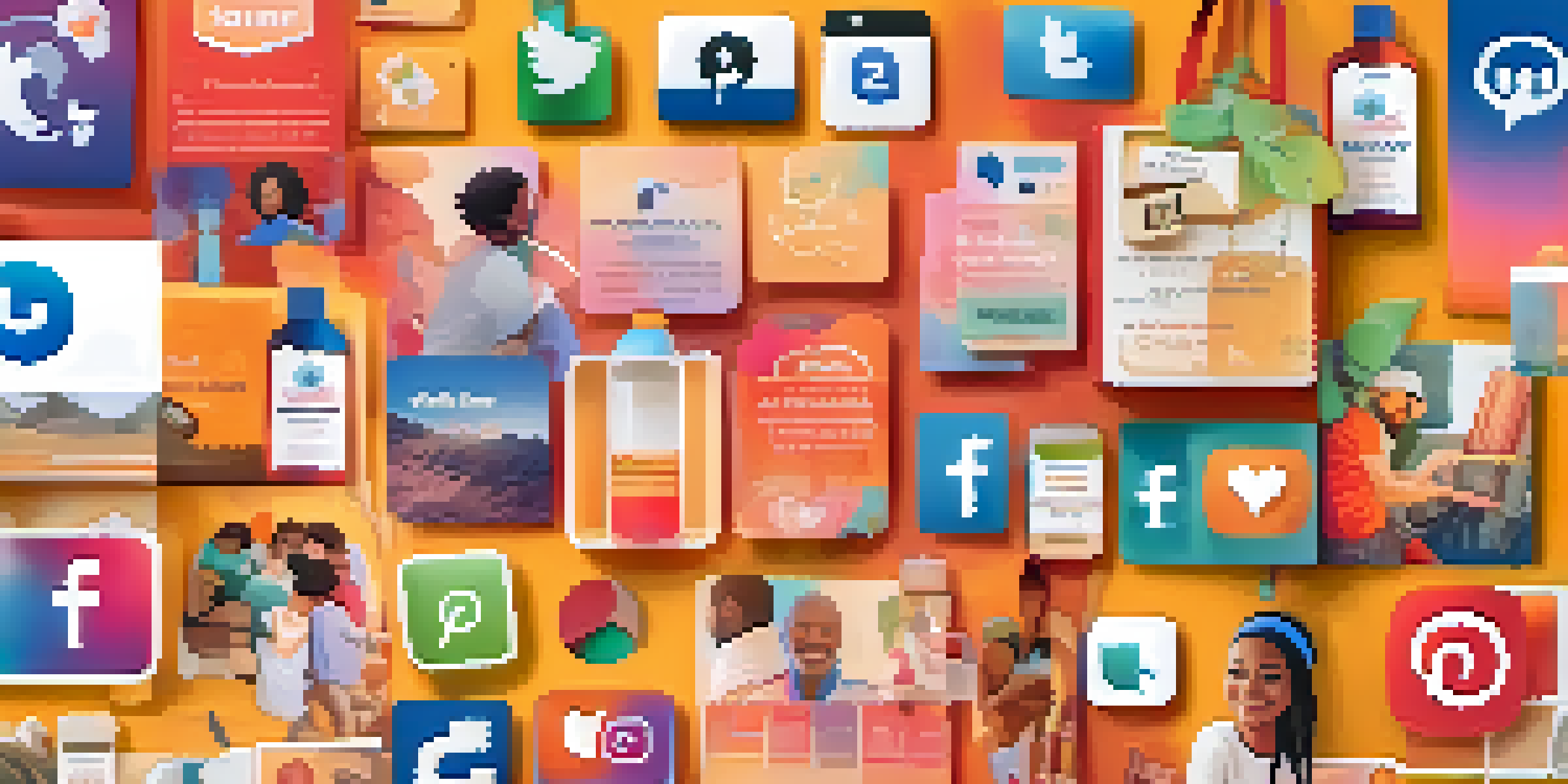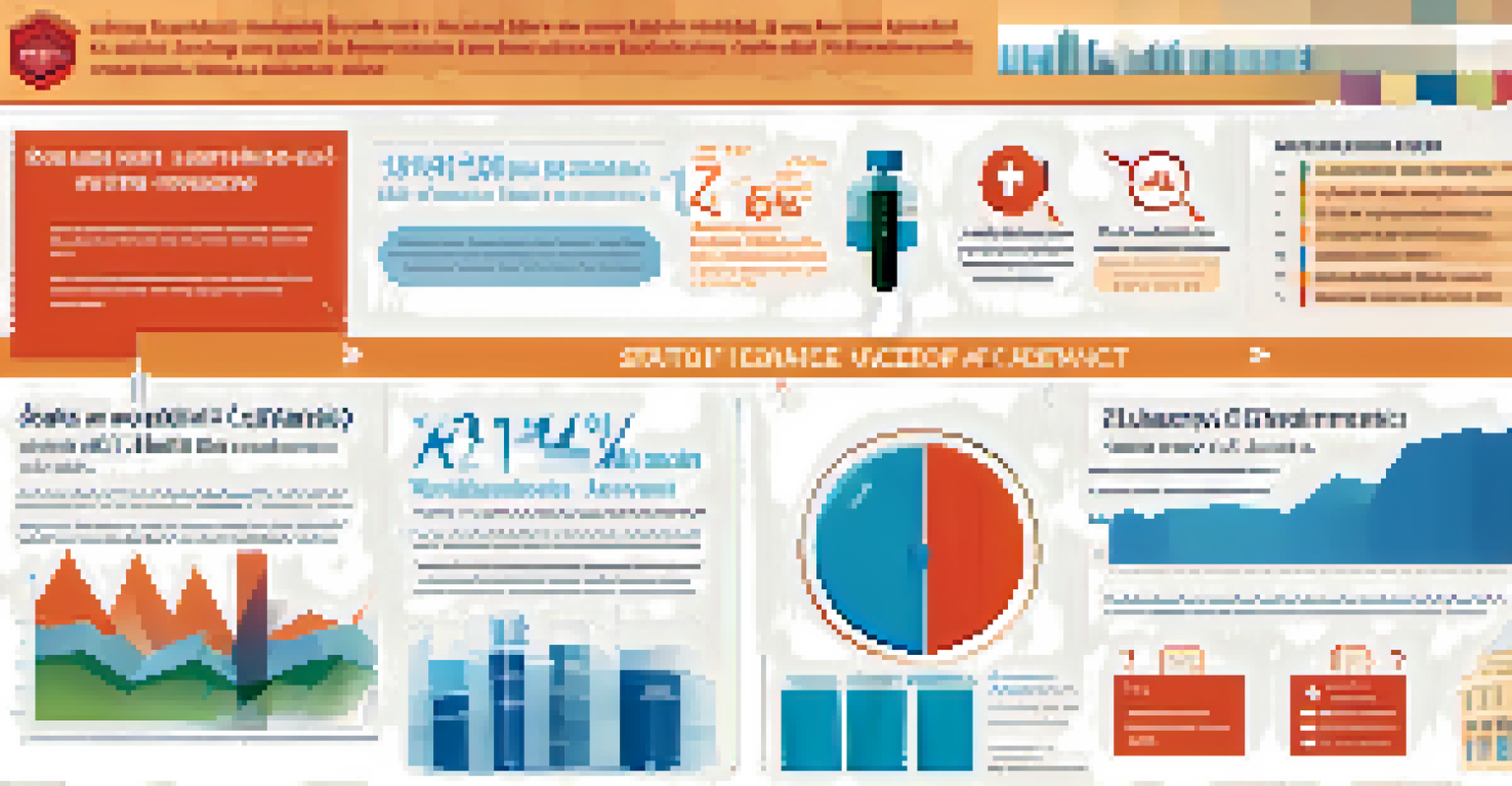Influence of Social Media on Vaccination Perceptions Today

The Rise of Social Media and Its Role in Health Discourse
Social media has transformed how we communicate and share information, especially regarding health topics like vaccinations. Platforms like Facebook, Twitter, and Instagram allow users to exchange opinions, experiences, and information in real time. This instant connectivity can help spread awareness but can also lead to the rapid dissemination of misinformation, creating a complex landscape for public health discussions.
The greatest danger in times of turbulence is not the turbulence; it is to act with yesterday's logic.
For example, a viral post on a platform may highlight negative experiences related to vaccines, which can resonate with individuals who share similar concerns. As people engage with this content, it can amplify fears and doubts about vaccinations. Thus, the same tools that foster community can also contribute to confusion and hesitancy regarding vaccines.
This environment requires health professionals and organizations to be proactive in providing accurate information. They must navigate this digital space to counteract misinformation and foster informed discussions about the benefits of vaccinations.
Misinformation: The Double-Edged Sword of Social Media
Misinformation about vaccines spreads rapidly through social media, often outpacing factual information. This can lead to widespread misconceptions, such as the debunked link between vaccines and autism. As users share posts that resonate with their beliefs, misinformation can gain credibility and influence public perception significantly.

A study found that misleading vaccine content is often more engaging than accurate information, leading to a 'like' or share frenzy that can overwhelm factual content. This phenomenon shows how the emotional appeal of misinformation can overshadow the cold, hard facts. As a result, individuals may find themselves swayed by narratives that confirm their pre-existing beliefs, even if those beliefs are unfounded.
Social Media's Role in Health Discourse
Social media facilitates real-time sharing of health information, which can both enhance awareness and spread misinformation about vaccines.
Addressing misinformation requires a collective effort from social media platforms and public health advocates. It's vital to promote reliable sources and encourage critical thinking among users to safeguard public health.
Influencers: Shaping Vaccine Narratives on Social Media
Influencers play a significant role in shaping opinions on social media, and their stance on vaccinations can have a considerable impact. When a popular figure advocates for vaccines, it can help normalize the conversation and encourage their followers to seek information from trusted sources. Conversely, if an influencer spreads vaccine skepticism, it can lead to increased hesitancy among their audience.
Truth is powerful and it prevails.
For instance, during the COVID-19 pandemic, some celebrities used their platforms to share their vaccination experiences, which helped to promote vaccine acceptance. Their personal stories often humanize the vaccination process, making it more relatable and approachable for their audiences. This type of authentic engagement can foster trust and encourage discussions about health.
However, the influence of these figures comes with responsibility. It’s crucial for influencers to base their messages on credible science, as their followers may take their words at face value. This highlights the need for a balanced approach in influencer marketing within the health sector.
Community Engagement: Building Trust Through Social Media
Social media can serve as a powerful tool for building trust within communities about vaccinations. By creating platforms where individuals can ask questions and share their concerns, healthcare providers can foster an atmosphere of open dialogue. This engagement is essential for addressing fears and misconceptions surrounding vaccines.
For instance, local health departments can utilize social media to host Q&A sessions or live discussions about vaccines, allowing community members to interact directly with experts. These initiatives help demystify the vaccination process and make people feel heard. When individuals feel their concerns are validated, they are more likely to trust the information provided.
Influencers Shape Vaccine Opinions
Influencers significantly impact vaccination narratives, as their endorsements or skepticism can sway public perceptions and behaviors.
Moreover, positive community stories about vaccination experiences can help shift perceptions. By showcasing real-life testimonials and endorsements from trusted local figures, social media can effectively counteract negative narratives and promote a culture of vaccination acceptance.
The Role of Educational Content in Vaccine Acceptance
Educational content about vaccines is crucial in combating misinformation and fostering public understanding. Social media platforms are increasingly being used to disseminate clear, science-backed information about the importance of vaccinations. Infographics, videos, and live streams can be effective tools for communicating complex health information in an engaging way.
For example, short, informative videos that explain how vaccines work can demystify the process and answer common concerns. These visual aids can be more accessible than traditional text-based resources, especially for younger audiences who frequent social media. By breaking down complex ideas into digestible formats, educational content can empower individuals to make informed decisions about their health.
However, it's essential for this content to be reliable and sourced from credible organizations. Collaborating with healthcare professionals to create and share educational materials can enhance trust and ensure that the information resonates with the audience.
The Impact of User-Generated Content on Vaccine Perceptions
User-generated content, such as personal stories and testimonials, can significantly impact vaccine perceptions. When individuals share their vaccination experiences on social media, they humanize the process and provide relatable narratives. These stories can resonate with others, helping to alleviate fears and promote a positive view of vaccinations.
For instance, a parent sharing their child's positive vaccination experience can encourage other parents who may be hesitant. This type of peer influence can be more persuasive than messages from healthcare providers, as it feels more authentic and relatable. When people see their friends or family discussing vaccines positively, it can foster a sense of community and shared responsibility.
User-Generated Content Matters
Personal stories shared on social media can humanize vaccination experiences and encourage acceptance among hesitant individuals.
However, it’s crucial to ensure that these narratives are balanced and not solely focused on negative experiences. Encouraging a variety of personal stories can help create a more comprehensive view of vaccination, showcasing both the benefits and addressing concerns in a constructive manner.
Challenges Ahead: Navigating Social Media's Vaccine Landscape
As social media continues to evolve, so do the challenges surrounding vaccine perceptions. The algorithms that govern what users see can inadvertently prioritize sensational content over factual information. This creates an uphill battle for public health advocates who strive to disseminate accurate information amidst a sea of misinformation.
Moreover, the sheer volume of content can overwhelm users, making it difficult to discern credible sources. As individuals navigate their social media feeds, they may encounter conflicting messages, which can contribute to confusion and distrust in health recommendations. This highlights the importance of media literacy education to help users critically evaluate the information they encounter.

Moving forward, collaboration between social media platforms, healthcare organizations, and community leaders will be essential. By working together, they can create strategies to promote accurate information, support vaccine acceptance, and ultimately protect public health in the digital age.